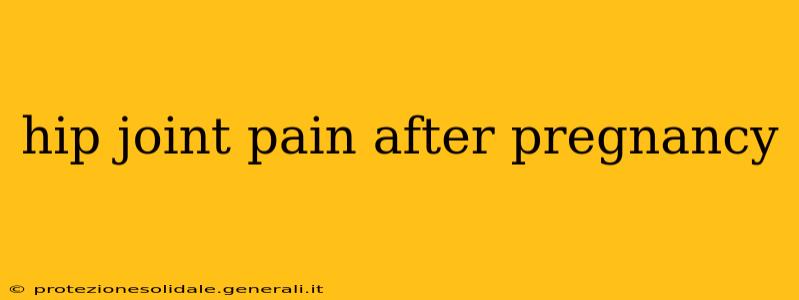Pregnancy and childbirth place significant stress on the body, and one common consequence is hip pain. Many women experience hip discomfort after delivery, impacting their mobility and overall well-being. This comprehensive guide explores the causes, treatments, and preventative measures for hip joint pain post-pregnancy.
What Causes Hip Pain After Pregnancy?
Several factors contribute to hip pain following pregnancy. Understanding these underlying causes is crucial for effective management.
Hormonal Changes:
During pregnancy, the body produces relaxin, a hormone that softens ligaments and prepares the body for childbirth. While beneficial for delivery, this hormonal shift can also lead to increased joint laxity, making the hips more susceptible to instability and pain. This laxity can persist for several months postpartum.
Weight Gain:
The average weight gain during pregnancy puts extra strain on the weight-bearing joints, including the hips. This increased pressure can lead to inflammation and pain, especially in women who already had pre-existing hip conditions.
Postural Changes:
The shifting center of gravity during pregnancy often results in postural changes, such as an altered gait and increased lumbar lordosis (inward curvature of the lower back). These changes can impact hip alignment and contribute to pain.
Muscle Weakness:
Pregnancy weakens core and pelvic floor muscles, affecting hip stability. This weakness can lead to improper joint mechanics and increased risk of injury and pain.
Pelvic Instability:
Symphysis pubis dysfunction (SPD) and sacroiliac (SI) joint dysfunction are common during and after pregnancy. These conditions involve pain and instability in the pelvic joints, often radiating to the hips.
What are common complications related to hip pain after pregnancy?
Complications from untreated hip pain after pregnancy can range from chronic pain and reduced mobility to difficulties with breastfeeding and caring for a newborn. Prolonged pain can lead to sleep disturbances and emotional distress. It can also hinder a woman's ability to return to physical activities and pre-pregnancy routines, impacting both physical and mental well-being. Ignoring the issue could lead to long-term joint problems requiring more intensive interventions.
How long does hip pain after pregnancy last?
The duration of hip pain after pregnancy varies significantly among individuals. For some, the discomfort subsides within a few weeks postpartum, while others experience persistent pain for several months or even longer. The severity and duration depend on factors like the intensity of the pain before, during, and after pregnancy, the type and extent of the underlying cause (hormonal changes, muscle weakness, etc.), and the effectiveness of treatment measures. Regular exercise and physical therapy are often key to reducing the duration of pain and improving long-term outcomes.
What are the best exercises to relieve hip pain after pregnancy?
Gentle exercises that focus on strengthening core muscles, improving hip flexibility, and stabilizing the pelvic floor are essential for relieving hip pain after pregnancy. These exercises should be performed gradually and under the guidance of a physical therapist or healthcare professional to avoid re-injury. Examples include pelvic tilts, glute bridges, and gentle stretches for the hip flexors and hamstrings. It is crucial to avoid high-impact activities initially.
What treatments are available for hip pain after pregnancy?
Several treatment options can effectively alleviate hip pain after pregnancy. These may include:
- Physical Therapy: This is often the first line of treatment, focusing on strengthening weakened muscles, improving joint mobility, and correcting postural imbalances.
- Manual Therapy: Techniques like osteopathic or chiropractic manipulation can address joint restrictions and improve alignment.
- Pain Management: Over-the-counter pain relievers like ibuprofen or acetaminophen can provide temporary relief. In some cases, a doctor may prescribe stronger medication.
- Rest and Ice: Resting the affected hip and applying ice packs can reduce inflammation and pain.
- Support Devices: Using a supportive maternity belt or other assistive devices can help stabilize the pelvis and reduce pain.
Preventing Hip Pain After Pregnancy
While not all hip pain is preventable, proactive steps can significantly reduce the risk:
- Maintain a Healthy Weight: Avoiding excessive weight gain during pregnancy reduces stress on the joints.
- Regular Exercise: Engage in moderate exercise throughout pregnancy, focusing on core strengthening and pelvic floor exercises (Kegels). Consult your doctor or a qualified fitness professional for safe exercise recommendations.
- Good Posture: Maintain good posture throughout pregnancy and postpartum to minimize strain on the hips.
- Pelvic Floor Physiotherapy: Consider pelvic floor physiotherapy during and after pregnancy to strengthen supporting muscles.
When to Seek Medical Attention
If your hip pain is severe, persistent, or accompanied by other symptoms like numbness, tingling, or weakness, consult your doctor or a physical therapist immediately. Early intervention is key to preventing long-term complications.
This information is for general knowledge and does not constitute medical advice. Always consult with a healthcare professional for diagnosis and treatment of hip pain.
